For the past several months, our intrepid Summer Stewardship Crew (or “Stew Crew,” as we call it) weathered heat and downpours as they constructed trails and did other field work on Lancaster Conservancy nature preserves.
The crew was made up of eight people, mostly young adults in or just out of college, who are interested in learning more about a career in conservation. The green-collar job initiative enables the crew to get hands-on experience training with our stewardship experts while they provide some much-needed labor to support our preserves.
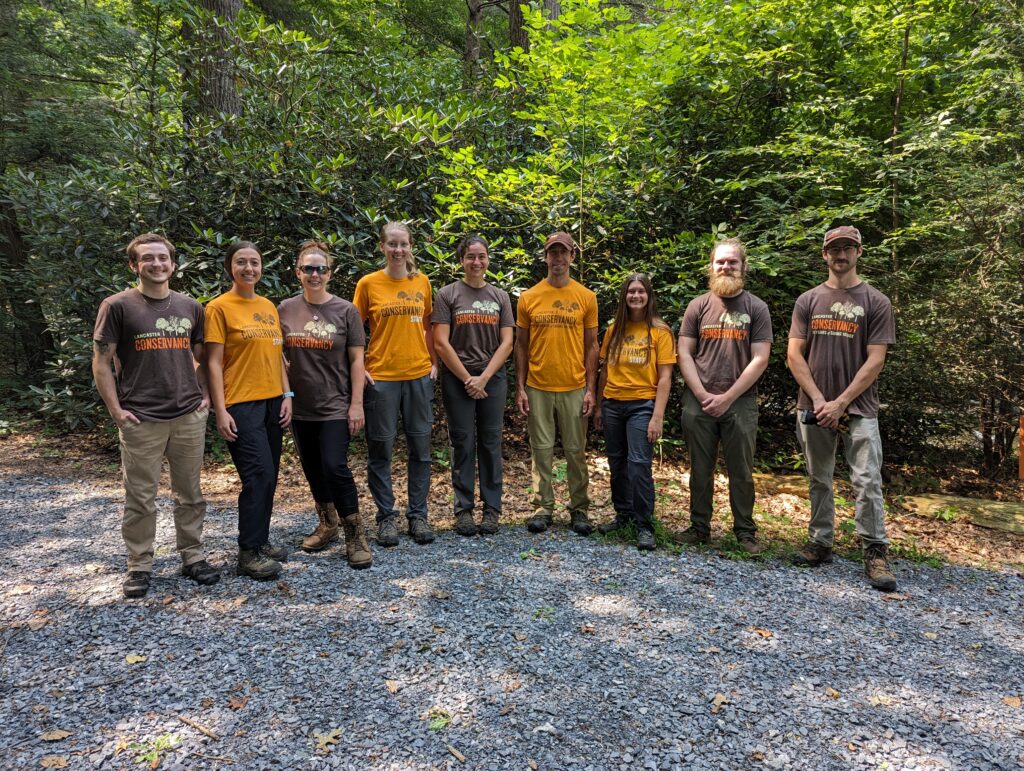
2023 Summer Stewardship Crew (From left to right: Matthew Lebel, Makenzi Reed, Kayla Ruppert, Sydney Levins, Jerilyn Lapp, Alex Swavely, Kayla Conner, Aaron Eby-Good, and Conservancy Land Steward Mark Roberts)
“Throughout 12 weeks, our crew of seasonal land stewards put over 3,000 hours into constructing, improving, and restoring miles of hiking trails within Tucquan Glen & Pyfer Nature Preserves, Wizard Ranch Nature Preserve, Hellam Hills Nature Preserve, and Mill Creek Falls Nature Preserve,” said Mark Roberts, the Conservancy Land Steward who leads the Stew Crew. “They also conducted extensive habitat restoration at Wizard Ranch Nature Preserve under the direction of our forester, Eric Roper.”
“Creating trails is no easy task. The hardships this crew has persevered through come with an everlasting effect that helps secure recreation opportunities on our land for generations,” Mark added.
Here’s what some of the crew members had to say about their experience:
Why were you interested in being part of this Summer Stewardship Crew at the Lancaster Conservancy?
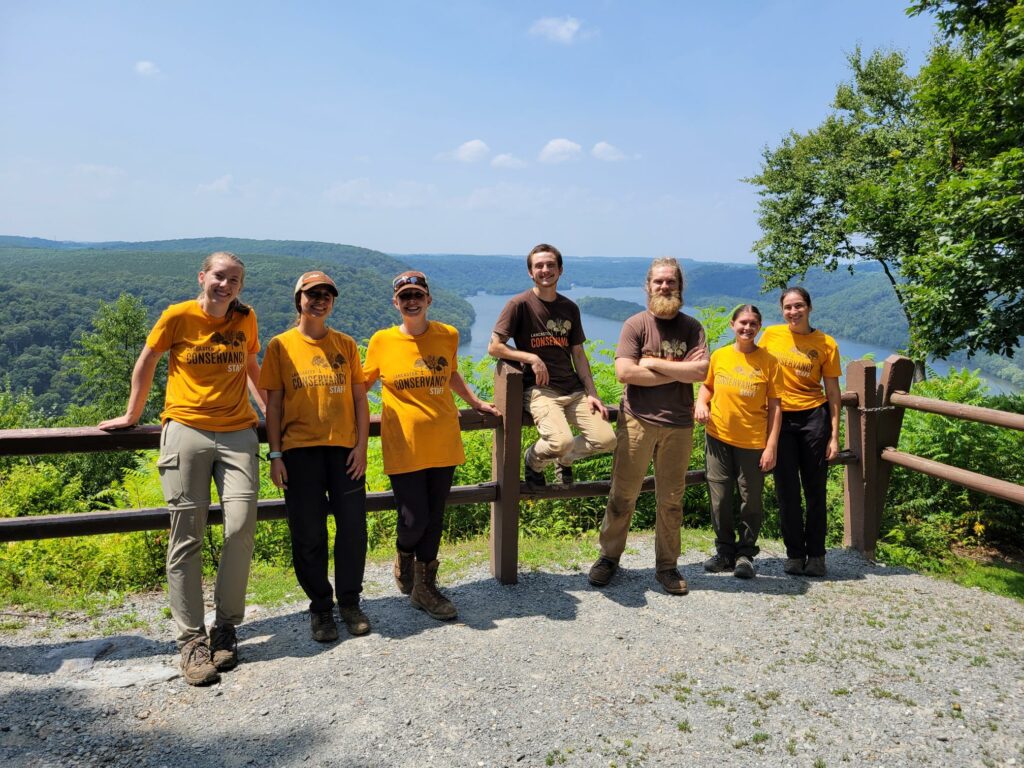
2023 Summer Stew Crew (Photo by Mark Roberts)
Aaron Eby-Good, 22-year-old environmental biology major at Millersville University: I joined the crew for the second summer in a row because I enjoyed the physical work and the time spent outside. I believe the Conservancy’s projects are making a great positive impact on the local environment and community, and I was grateful for the opportunity to continue some of these projects I really believe in for another summer.
Kayla Connor, 23-year-old Frostburg State University graduate who studied wildlife and fisheries science: I was interested in the Summer Stewardship Crew at Lancaster Conservancy because I was a new college graduate with a wildlife degree and not quite sure what path I wanted to take. I thought applying for this position would allow me to show things I’ve learned at school, get me working outside, and also learn new aspects that go into trail building.
Sydney Levins, 21-year-old environmental science major at Franklin & Marshall College: I was interested in joining the Summer Stew Crew because I wanted to have a position that related to my areas of study but took me in a different direction than research. I wanted to learn more about conservation at a local level. I was also excited to spend the summer outside.
What interests you about conservation work? Why do you think it’s important?
Jerilyn Lapp, 23-year-old environmental science major at Emory University: I want to work in conservation long-term because I want to do work I can be proud of – also, being outdoors every day is a plus. Conservation is important because we have a responsibility to care for the Earth which supports our lives.
Kayla Ruppert, 34-year-old nature-loving mom: I am interested in conservation work because I have seen the land in the area disappear to countless warehouses and think it’s very important to protect what we have before it’s all gone or destroyed.
Makenzi Reed, 19-year-old environmental science major at Elizabethtown College: Conservation is so important because it not only impacts our generation, but also future generations to come. The hard work we put in now will only help human and wildlife species thrive hereafter. The best thing about conservation that strikes me is that you’re helping – helping balance the interactions between humans and wildlife, helping preserve endangered or vulnerable species, and helping ecosystems thrive.
What kinds of work did you do this summer as part of the Stew Crew?
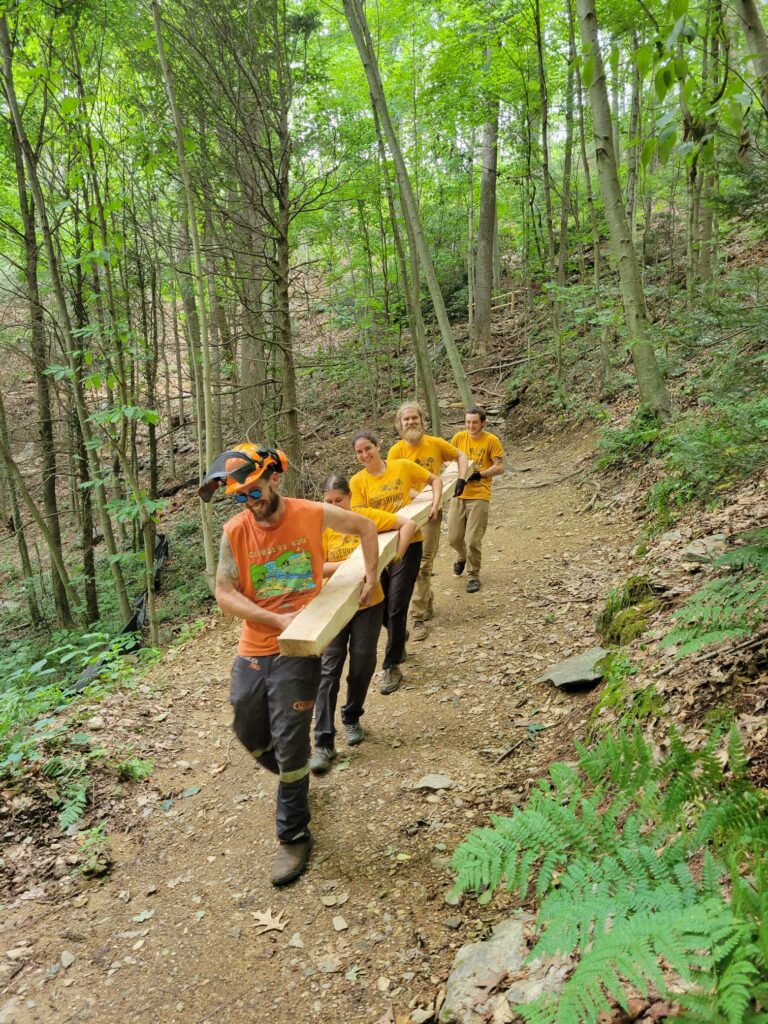
Stew Crew moves lumber for bridge feature construction (Photo by Mark Roberts)
Aaron Eby-Good: This summer I worked as a member of the Lancaster half of the crew, and we primarily focused on completing a reroute through a section of Tucquan Glen and Pyfer Nature Preserves. I helped construct a new trail by building drainage areas and steps from logs and rocks. We also did habitat restoration work at Wizard Ranch, removing invasive plants and clearing space for upcoming tree plantings in a riparian buffer.
Makenzi Reed: As a crew, we established and constructed new hiking trails at various nature preserves. We also brushed existing trails (using loppers), making them wider and clearer for hikers. In addition, we worked on habitat management/restoration by clearing invasive species such as mile-a-minute, privet, honeysuckle, etc. Smaller projects included skinning locust logs at the Holtwood shop, foraging the hills of Tucquan Glen to find the perfect rock for a retaining wall, and spraying invasives at Wizard Ranch at the controlled burn site.
Sydney Levins: We did a variety of work over the summer, including blazing new trails, building crib steps, removing invasive vegetation, prepping for tree planting, and more. My personal favorite was building retention walls to prevent erosion.
What has been your favorite part of being a member of the Summer Stew Crew? Is there a particular memory or experience that stands out?
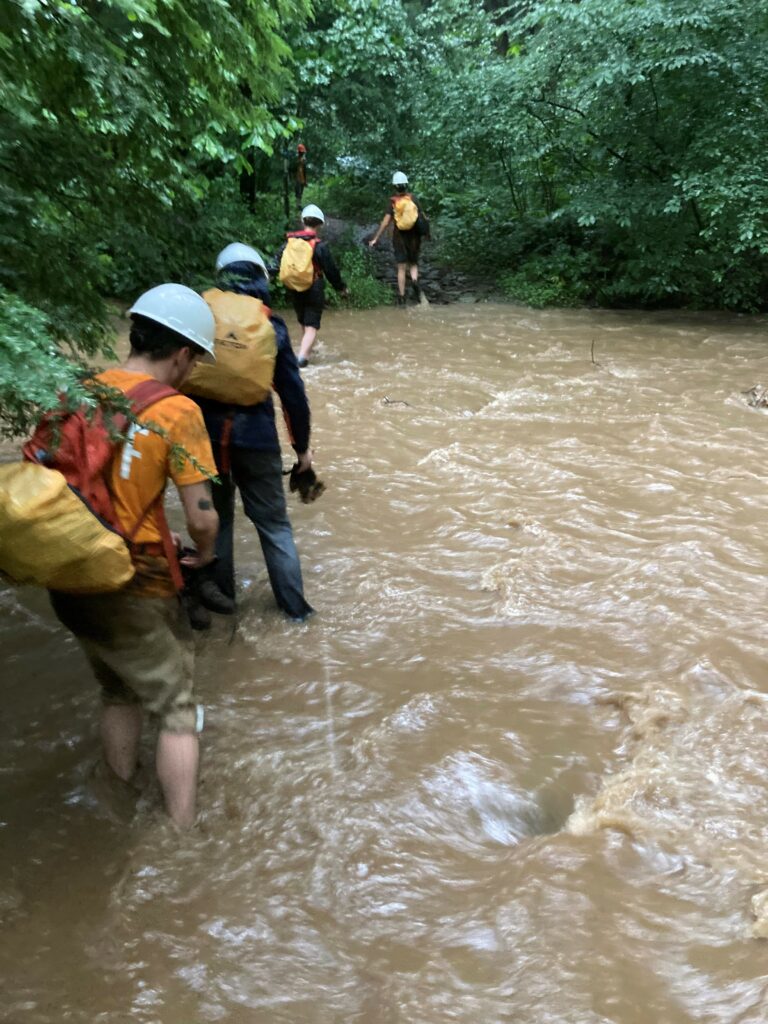
Stew Crew wades through Tucquan Creek after rain (Photo by Aaron Eby-Good)
Aaron Eby-Good: My favorite part of this job has always been getting to spend so much time outside. I love encountering unique wildlife, learning to identify plant species, and adapting to outdoor conditions on a day-to-day basis. One memorable afternoon, we got caught in a rainstorm just after lunch but decided to weather it out. After the rain passed, we got back to work, but on the way home it poured again. To make it back we had to wade through the knee-deep Tucquan Creek. Though it was pretty miserable at the time, there’s something special about experiencing whatever nature throws at you!
Kayla Connor: My favorite part of being on Stew Crew was learning so much about trail building and all that goes into it. It truly takes a lot more planning and hard work than I ever imagined. This type of work is hard, but also very rewarding because you know you are building something with your own hands for people and yourself to come and enjoy out in nature. Being able to see the progression every day of the trail building work has really stood out to me. Some of my favorite memories include finishing what seemed like impossible projects with others on the team, and also getting to see so much wildlife like deer, skinks, turtles, snakes, fish, and many, many insects, along with a huge variety of plants like orchids, Jack-in-the-pulpit, lilies, and so many other native wildflowers.
Kayla Ruppert: My favorite part of being in the Stew Crew was the experience! I have had many jobs before but this was the most amazing! I was around people that cared for nature the same way I do. I learned so much from the college kids. I honestly struggle with depression and this experience made me see things differently. I have hope for the generation coming up because these kids had so much passion for the trees and the critters alike. It really was a one-of-a-kind experience, that I was blessed to enjoy!
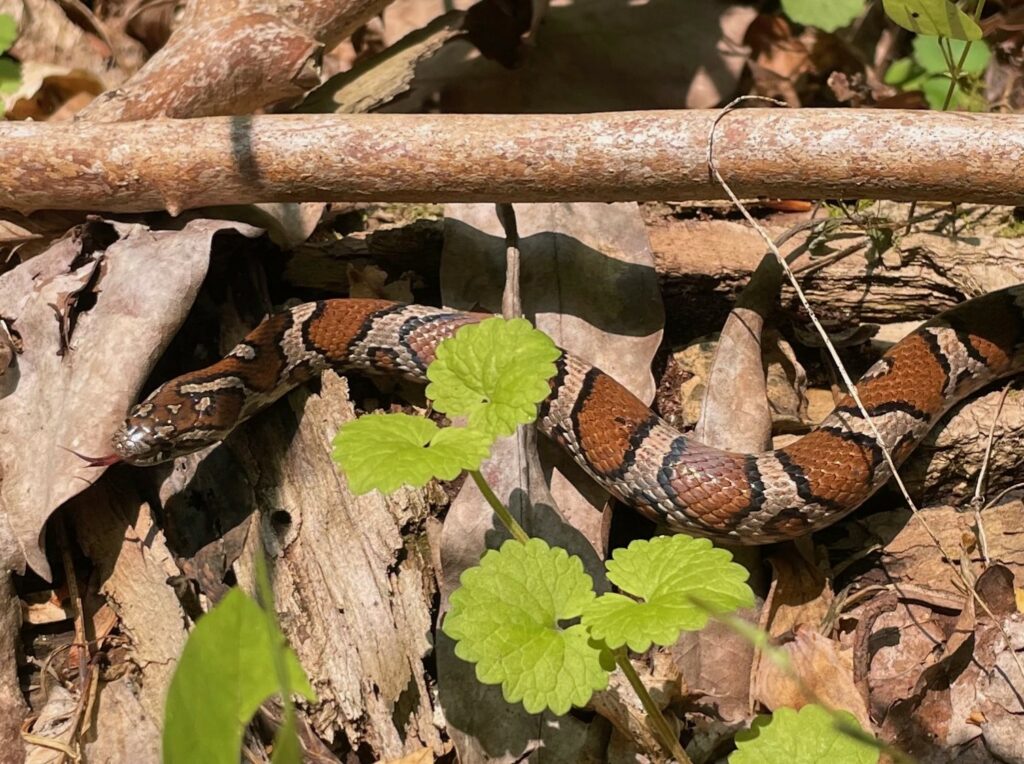
Snake (Photo by Makenzi Reed)
Makenzi Reed: My favorite part of being on the Stew Crew is seeing the progress we made from the start to the end of the summer. To know that we made an impact on various nature preserves is such a rewarding feeling. Another great aspect of the job was getting to know the crew. I’ve made some great connections and memories with them that I will surely cherish after the job. (Another bonus part of the job was encountering all the critters in the wild such as turtles, toads, and snakes.)
What did you learn or experience during your time in the Summer Stew Crew that will be helpful or impactful for your future career?
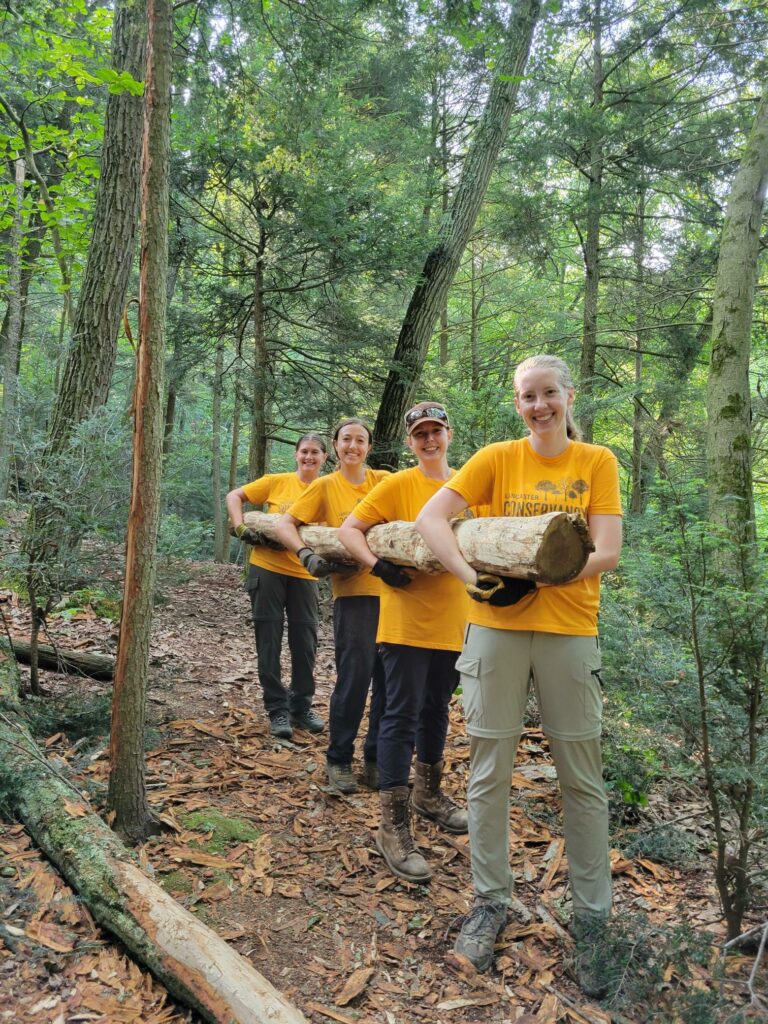
2023 Stew Crew at work (Photo by Mark Roberts)
Aaron Eby-Good: I had many opportunities to learn valuable career-focused information this summer. Talking with the other staff at the Conservancy gave me great insight into some career paths in the environmental field. I loved learning about fire ecology and different habitat management techniques. I also gained plenty of plant and bird identification knowledge.
Jerilyn Lapp: It has been helpful to gain a different, more realistic perspective about conservation than I have gotten from school. The work is often time-consuming, messy, and unpredictable, but I have learned that logic and consistent physical labor are both crucial for building safe trails and a healthier ecosystem.
Makenzi Reed: The most valuable thing I learned through this job was plant identification. Prior to being on the crew, I had no experience identifying anything. Now I can spot most invasives, tree species, and native plants. This will most definitely aid me in my future career goals of being a researcher in the conservation field.
Sydney Levins: I learned how much detail goes into conservation work at every level. There is so much planning and physical labor that goes into every task we do.
The Lancaster Conservancy is so grateful for all the work completed by the Summer Stew Crew this season! We hope they are inspired to continue into conservation careers and join in the critical mission of caring for our planet.
Thank you also to the donors who provided funding to make the Summer Stewardship Crew possible for both this year and next year in honor of the Conservancy’s previous President & CEO Phil Wenger.
